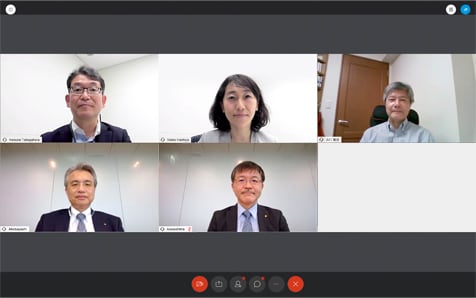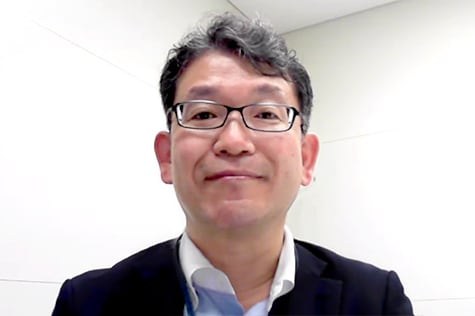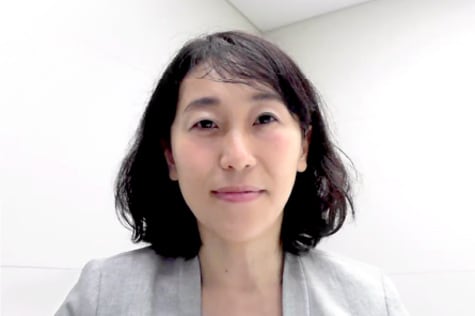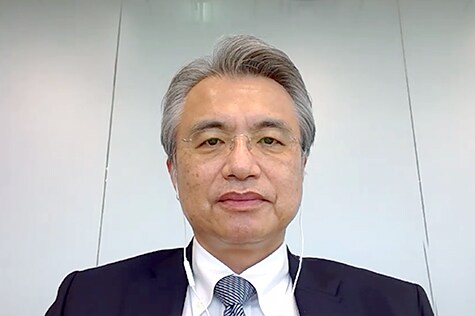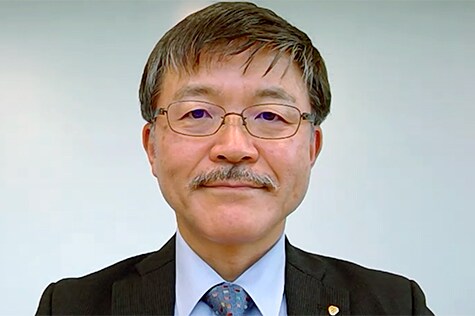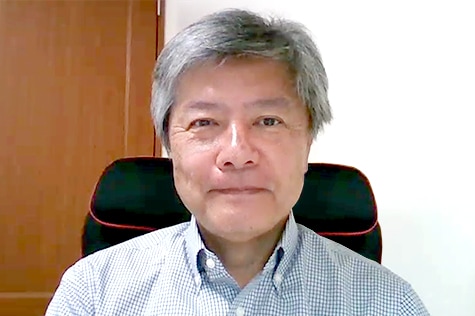Key CSR Issues:Develop and Prosper in Harmony with the Global Environment
Balancing a Response to Climate Change with Corporate Growth
What Is Required of the TDK Group
As the global community seeks to address climate change with
increasing urgency, what is required of the TDK Group to balance
corporate growth with the creation of social value?
In an effort to gain an outside perspective and develop more
appropriate responses and strategies, on July 8, 2020, we held a
dialogue with Keisuke Takegahara and Maiko Hachiya of the
Development Bank of Japan.
Aiming to Integrate Sustainability and Business under the TDK Environmental Vision 2035
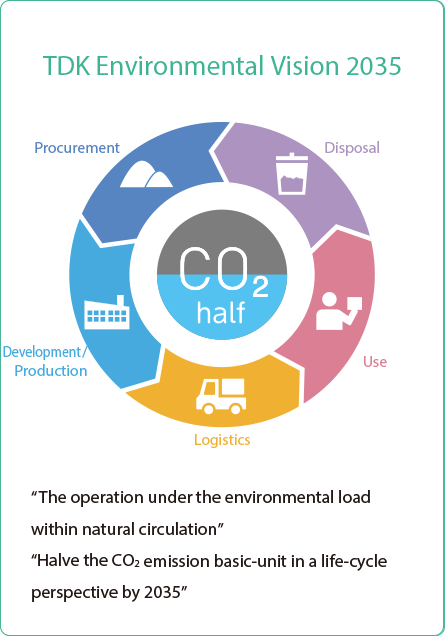 The TDK Group believes that developing and prospering in harmony
with the global environment is one of key CSR issues, and is
advancing efforts to achieve the TDK Environmental Vision 2035
formulated in 2016.
The TDK Group believes that developing and prospering in harmony
with the global environment is one of key CSR issues, and is
advancing efforts to achieve the TDK Environmental Vision 2035
formulated in 2016.
The dialogue began with a description by Sachiko Nagahara,
General Manager of the Sustainability Promotion HQ, of TDK Group
policies aimed at expanding social value under “Value Creation
2020,” the TDK Group’s Medium-Term Plan, and its efforts to
address energy and environmental problems. The participants then
affirmed an overarching theme for the discussion: “What is
important in enhancing social value in environmental terms, and
in enabling the TDK Group to achieve sustainable growth?”
Next, Mr. Takegahara offered a view of the current and future
state of ESG investing. He said, “ESG investors are focused on
whether companies can look beyond future uncertainty and grow
sustainably. Their ability to recognize long-term social issues
and present a business model that incorporates those issues in
their strategy is being challenged.” With regards to the current
ongoing spread of the COVID-19, he also commented that, “While
uncertainty about the future has only grown stronger, this basic
approach to ESG investing is not going to change. Climate
change, in particular, continues to be the greatest risk factor
from a long-term perspective through 2050 and beyond.”
Regarding the TDK Group’s own efforts, he offered a positive
assessment of work being done under the TDK Environmental Vision
2035 to calculate and disclose the Company’s environmental load
across its entire product lifecycle, including Scope 1 (the
Company’s own direct emissions), Scope 2 (indirect emissions
associated with the use of electricity, etc. supplied by other
companies), and Scope 3 (indirect emissions other than Scope 1
and 2). Ms. Hachiya noted that, “Under its Environmental Vision
2035, TDK has set a high goal, seeking to halve its CO2
emission basic unit from a lifecycle perspective. Their efforts
to integrate sustainability and business-incorporating both a
reduction in the negative environmental impact of business
activity and an increase in the positive impact of environmental
contributions made through their products-represent a very
advanced approach.”
That said, Mr. Takegahara and Ms. Hachiya also pointed out that
it was difficult to see any consistency with international
benchmarks. “Representing everything in terms of CO2
emission basic units allows quantitative data to be collected,
but seen against global efforts toward the goal of controlling
rising temperatures, it can be harder to convey TDK’s advantage.
The types of frameworks and KPIs you use will likely come into
question going forward.”
Keisuke Takegahara
Development Bank of Japan Inc.
Executive Officer, Deputy Chief Research Officer, Chief
Manager of Sustainability Management Office, Corporate
Planning & Coordination Department
Joined the Japan Development Bank (now the Development Bank
of Japan Inc.) in 1989. Worked as chief representative in
Frankfurt, before assuming current position. A pioneer in
environmental finance in Japan, including development of the
DBJ Environmentally Rated Loan Program.
Holds numerous public positions, including ad hoc member of
the Ministry of the Environment’s Central Environment
Council and the Industrial Structure Council of the Ministry
of Economy, Trade and Industry.
Maiko Hachiya
Development Bank of Japan Inc.
Senior Vice President, Sustainability Planning & Support
Department
Joined the Japan Development Bank (now the Development Bank
of Japan Inc.) in 2002. Worked in the Hokuriku Branch, the
Credit Analysis Department, before assuming current
position. Member of the ESG Finance High-level Panel
Positive Impact Finance Task Force.
How Should a Midstream Company Work
to Reduce Emissions in the Supply Chain?
At the COP25 conference held in December 2019, a target was
presented to limit global warming to 1.5 degrees Celsius,
exceeding the long-term target set by the Paris Agreement of
limiting rising temperatures to within 2 degrees Celsius above
pre-industrial levels. This new target has gradually become a
global standard. Tetsuya Kuwashima, General Manager of the Safety
& Environment Group of Sustainability Promotion HQ explains
TDK’s policy as follows: “As concern about climate change grows
worldwide, I think the target of 1.5 degrees Celsius is right on
the nose, and is something we should work toward aggressively in
our efforts to address environmental issues. It is essential that
we first take the initiative in pursuing reductions in our own
emissions.
Laying the groundwork for its Environmental Vision 2035, the TDK
Group established a carbon neutral target under its TDK
Environmental Action 2020 plan, a goal it achieved ahead of
schedule in FY March 2014. This background today forms a foundation
for ongoing efforts to aim for even higher targets. TDK has set
forth a goal of contributing to energy transformation (EX) under
the internal slogan of “Eco-TDK,” and is advancing efforts to
improve productivity and to promote rigorous energy savings and a
shift to renewable energy.
Atsuo Kobayashi, Senior Vice President, said that, “An issue for
the Company now is to promote the use of renewable energy at our
sites in Japan. The cost of generating renewable energy in Japan
remains high compared to international standards. While it is
relatively easy to move ahead with the shift to renewable energy
at our sites overseas, Japan continues to fall behind.” The number
of global companies joining the international RE100* initiative
has grown in recent years, and TDK is also being asked to respond.
Both Mr. Takegahara and Ms. Hachiya offered the opinion that,
“While RE100 is one strategy for dealing with climate change risk,
whether membership is essential or not depends on the individual
company’s position. As a midstream company in the value chain, TDK
needs to carefully consider how much of a priority it gives to the
goal of achieving 100% renewable energy, and compare that goal to
its other efforts, including contributing to the environment
through its products.”
Looking at the environmental load of TDK Group products across
their lifecycle, the Company should also focus on the fact that
there is an overwhelming environmental load generated at the
product usage stage. Mr. Kuwashima said that, “As a B2B, midstream
company, we need to consider how we treat and reduce environmental
loads resulting from the use of our products by consumers in the
form of our customers’ end products. I think that will be the key
to contributing to a shift to a low-carbon society.”
*RE100: Member companies of this initiative, launched in 2014, are
committed to the goal of 100% renewable energy use in their
business operations.
Atsuo Kobayashi
Senior Vice President in charge of Quality Assurance and Safety & Environment
Sachiko Nagahara
General Manager, Sustainability Promotion HQ
Tetsuya Kuwashima
General Manager, Safety & Environment Group, Sustainability Promotion HQ
Tomohiko Yamaguchi (Facilitator)
Consultant, Cre-en Inc.
Reassessing the Risks and Opportunities
Around Climate Change as They Connect to Business
During the dialogue, participants exchanged opinions on the Task
Force on Climate-related Financial Disclosures (TCFD)*, for which
TDK expressed its support in FY March 2019. Mr. Takegahara said that
TCFD, which requires companies to analyze and disclose information
about the impact of climate change on corporate finances, is a
“tool designed to facilitate a dialogue between companies and
investors as they head into an uncertain future.” He noted that,
“TCFD’s scenario analysis emphasizes not accuracy so much as
breadth. Investors are focused on whether companies are able to
incorporate every possibility in reviewing their own risks and
opportunities, and whether they have strategies for surviving in
any situation.”
Sympathizing with that approach, Mr. Kuwashima said that, “Looking
across all enterprises, I think companies need to treat risks and
opportunities as a central part of their business strategy itself.
TDK is bringing an outside-in perspective to thinking about
technologies, solutions and products based on the social issues
set out in the SDGs, and in doing so, adds to the depth of that
discussion.” Touching on the TDK Group’s existing efforts to
create value through its business, Mr. Takegahara commented that,
“Recently, the impact of the COVID-19 has accelerated the
Company’s shift to digital. I think your ability to generate a
diverse range of products to support that shift may make it easy
for TDK to draw up a vision for contributing to the more efficient
use of energy.”
Mr. Kobayashi described TDK’s approach, saying that, “There are
many ways the Company can utilize its products and technologies to
contribute to addressing climate change. Digital transformation
(DX), such as that represented by 5G, is -along with EX- a pillar
of the Company, and it is crucial that we advance our
environmental contributions through those two pillars.” Another
participant indicated their agreement with these remarks, noting
that, “As we move in that direction, it is essential that we
encourage understanding of the value TDK offers, not just outside
the Company but internally as well. We need to involve employees
in every position, including workers in our manufacturing sites
and other front-line employees, and get them to take these issues
personally.”
Meanwhile, the TDK Group faces a new issue with its current effort
to drive business forward under the concept of Kotozukuri
(integrated solutions). Mr. Kuwashima pointed out that, “In
Monozukuri (manufacturing excellence), products have clear
specifications for energy savings and so forth, making it easy to
measure their impact on the environment. But the fact is that with
Kotozukuri, it is difficult to quantify the extent to which our
business is helping to reduce society’s environmental load. I
think issues remain with visualizing that impact.”
Both Mr. Takegahara and Ms. Hachiya agreed that this could be
difficult, but they also expressed hope for TDK’s efforts: “The
major premise is that good services and solutions can only succeed
if you have high-quality, superior products. TDK is singular in
continuing to take on the challenge of reducing environmental
loads even as it shifts its business model from Monozukuri to
Kotozukuri in response to changes in society. The world is still
searching for ways to express social impact, and there are no
clear guidelines. We look forward to seeing TDK attempt to develop
new standards and become a global leader.”
* The TCFD was founded in 2015 by the Financial Stability Board
(FSB), an international body seeking to achieve the stabilization
of the financial system.

